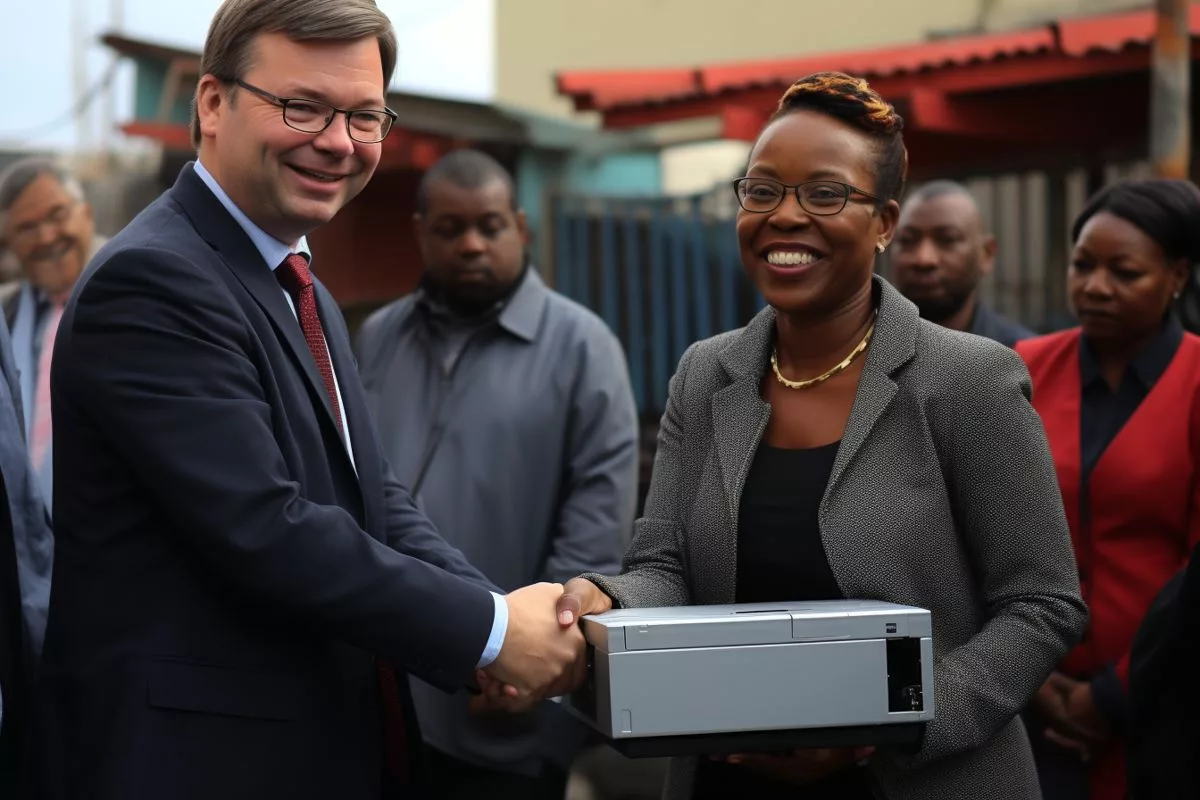South Africa’s Minister of Small Business Development, Stella Ndabeni-Abrahams, visited the Eastern Cape to support small businesses and informal traders by launching the Crudastar Incubator, providing essential business equipment, and facilitating access to funding. Her visit aimed to promote entrepreneurship and address critical issues such as unemployment and inequality. The government’s commitment to fostering an inclusive and diverse entrepreneurial ecosystem capable of addressing the region’s pressing challenges was exemplified by her visit.
What was the purpose of Minister Ndabeni-Abrahams’ visit to the Eastern Cape?
Minister Ndabeni-Abrahams’ visit to the Eastern Cape aimed to support and nurture small businesses and informal traders, promote entrepreneurship, and address critical issues such as sustainable livelihoods, unemployment, and inequality. She launched the Crudastar Incubator, provided essential business equipment to small businesses, and facilitated access to funding through the Eastern Cape Pitch for Funding competition. Her visit exemplifies the government’s commitment to fostering an inclusive and diverse entrepreneurial ecosystem capable of addressing the region’s pressing challenges.
Empowering Small Businesses and Informal Traders
South Africa’s Minister of Small Business Development, Stella Ndabeni-Abrahams, visited the Eastern Cape on November 2nd and 3rd to support small businesses and informal traders as part of her national initiative. The purpose of her visit revolved around strengthening and nurturing micro and informal enterprises to enhance their growth and help them reach their full potential. Additionally, this initiative seeks to promote entrepreneurship while addressing critical regional issues such as sustainable livelihoods, unemployment, and inequality.
On November 2nd, Minister Ndabeni-Abrahams launched the Crudastar Incubator in Makana Local Municipality, which serves as an example of her commitment. The incubator aims to create a supportive environment primarily for rural and township-based start-ups owned by women, youth, and persons with disabilities, aligning with the department’s vision for an inclusive and diverse entrepreneurial ecosystem.
During her visit, the Minister also provided essential business equipment to small businesses in Makana and Winnie Madikizela-Mandela local municipalities, as part of the Informal and Micro Enterprises Development Programme (IMEDP). This intervention aims to nurture and develop the entrepreneurial sector.
Supporting Entrepreneurs through Funding and Events
Another event on Minister Ndabeni-Abrahams’ agenda was the Eastern Cape Pitch for Funding competition. This platform allows small, medium, and micro enterprises (SMMEs) to present their ideas, innovations, and business cases to the Department of Small Business Development (DSBD) and its partners. Consequently, the competition facilitates access to financial and non-financial support for participating businesses.
Beyond these events, the Minister took part in a walk-about at the Exhibition Center, which preceded the Annual Stakeholders Forum hosted by the Small Enterprise Development Agency (SEDA). Additionally, she addressed the RUCC Farmer’s Day at Glengazi Farm, Ndimakude, Port St John’s, and distributed further business equipment to small businesses in Winnie Madikizela Mandela Municipality.
Minister Ndabeni-Abrahams’ visit to the Eastern Cape reflects the government’s commitment to supporting and nurturing small businesses and informal traders, who are integral to the South African economy. The two-day visit not only provided valuable resources and equipment to local businesses but also reinforced the department’s dedication to fostering an entrepreneurial ecosystem that is inclusive, diverse, and capable of addressing the region’s pressing challenges.
Encouraging Inclusivity and Growth in the Eastern Cape
With the support of Minister Ndabeni-Abrahams and her department’s initiatives, such as the Crudastar Incubator and the IMEDP, Eastern Cape’s entrepreneurs and small businesses can continue to grow and succeed. These programs, along with the Minister’s visit, exemplify the government’s commitment to uplifting and empowering the small business sector in the region.
The Minister’s focus on creating a supportive environment for start-ups owned by women, youth, and persons with disabilities also highlights the government’s dedication to fostering an inclusive entrepreneurial landscape. This emphasis on inclusivity is crucial, as it not only encourages the emergence of a diverse array of businesses but also helps address the long-standing issues of unemployment, inequality, and sustainable livelihoods faced by the region’s citizens.
In summary, Minister Stella Ndabeni-Abrahams’ visit to the Eastern Cape marks a significant milestone for the region’s small business sector. The government’s unwavering support and commitment to nurturing and empowering entrepreneurs, demonstrated by the various events and initiatives undertaken during the visit, offer a promising future for the growth and development of small businesses and informal traders in the Eastern Cape and beyond.
1. Who is Minister Stella Ndabeni-Abrahams?
Minister Stella Ndabeni-Abrahams is the Minister of Small Business Development in South Africa. She is responsible for promoting the growth and development of small businesses and informal traders in the country.
2. What was the purpose of Minister Ndabeni-Abrahams’ visit to the Eastern Cape?
Minister Ndabeni-Abrahams’ visit to the Eastern Cape aimed to support and nurture small businesses and informal traders, promote entrepreneurship, and address critical issues such as sustainable livelihoods, unemployment, and inequality. She launched the Crudastar Incubator, provided essential business equipment to small businesses, and facilitated access to funding through the Eastern Cape Pitch for Funding competition. Her visit exemplifies the government’s commitment to fostering an inclusive and diverse entrepreneurial ecosystem capable of addressing the region’s pressing challenges.
3. What is the Crudastar Incubator?
The Crudastar Incubator is a supportive environment primarily for rural and township-based start-ups owned by women, youth, and persons with disabilities. It aims to provide essential resources and guidance to emerging entrepreneurs, allowing them to grow and succeed in their businesses.
4. What is the Informal and Micro Enterprises Development Programme (IMEDP)?
The IMEDP is a program aimed at nurturing and developing the entrepreneurial sector in South Africa. It provides essential business equipment and resources to small businesses, helping them to grow and succeed in their businesses.
5. What is the Eastern Cape Pitch for Funding competition?
The Eastern Cape Pitch for Funding competition is a platform that allows small, medium, and micro enterprises (SMMEs) to present their ideas, innovations, and business cases to the Department of Small Business Development (DSBD) and its partners. The competition facilitates access to financial and non-financial support for participating businesses.
6. What is the government’s commitment to fostering an inclusive and diverse entrepreneurial ecosystem?
The government’s commitment to fostering an inclusive and diverse entrepreneurial ecosystem is demonstrated through initiatives like the Crudastar Incubator and the IMEDP. These programs aim to provide essential resources and guidance to emerging entrepreneurs, especially those from underrepresented groups such as women, youth, and persons with disabilities.
7. How does the emphasis on inclusivity help address regional issues in the Eastern Cape?
The emphasis on inclusivity helps address regional issues in the Eastern Cape by encouraging the emergence of a diverse array of businesses. This diversity not only contributes to the growth of the regional economy but also helps address the long-standing issues of unemployment, inequality, and sustainable livelihoods faced by the region’s citizens.
8. What does Minister Ndabeni-Abrahams’ visit mean for the small business sector in the Eastern Cape?
Minister Ndabeni-Abrahams’ visit to the Eastern Cape marks a significant milestone for the region’s small business sector. The government’s unwavering support and commitment to nurturing and empowering entrepreneurs, demonstrated by the various events and initiatives undertaken during the visit, offer a promising future for the growth and development of small businesses and informal traders in the Eastern Cape and beyond.








